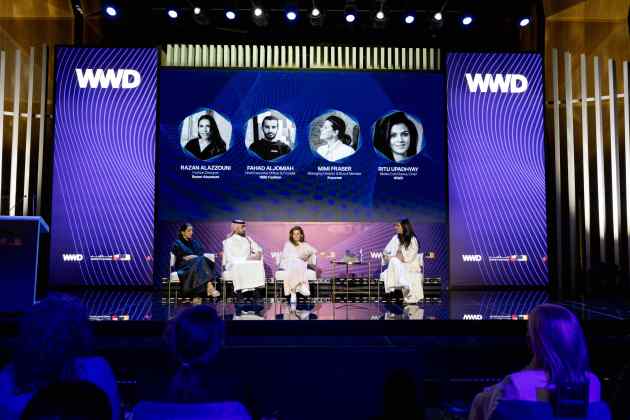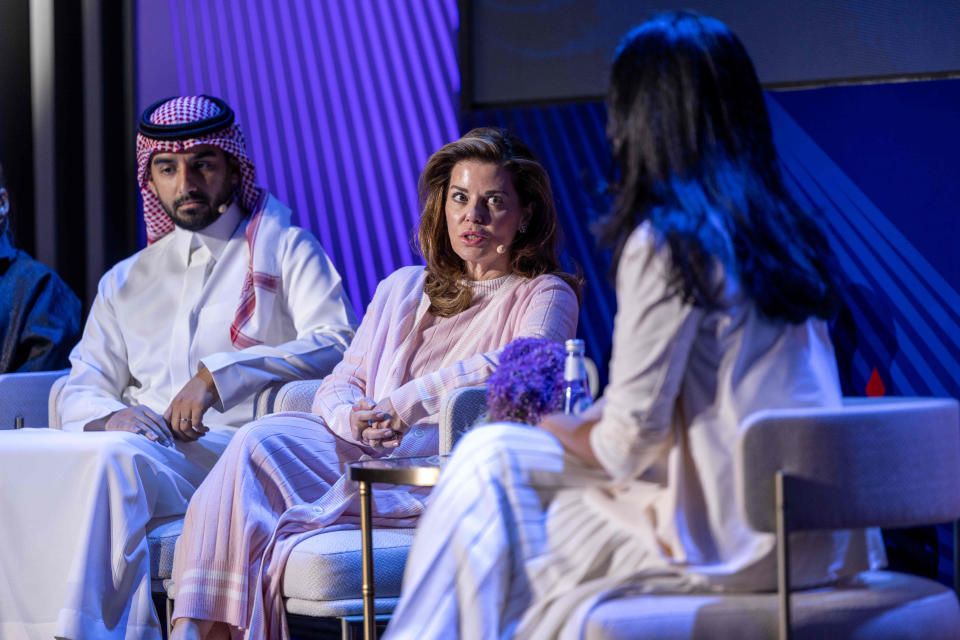Saudi Designers Talk Entrepreneurship

“People are falling in love with Saudi culture again,” Mimi Fraser, managing director and board member of premium activewear brand Kayanee, told the WWD Global Fashion Summit in Riyadh. “This is a country that has a massive creative backbone — not just from the creative point of view, from a cultural point of view.”
Fraser was one of three local fashion entrepreneurs speaking on a panel moderated by Ritu Upadhyay, WWD’s Middle East bureau chief.
More from WWD
The others were designer Razan Alazzouni, who founded her womenswear brand in 2008 alongside her sisters Salwa and Raya, and Fahad Aljomiah, cofounder and chief executive officer of streetwear firm 1886 Fashion.
“All the community are proud to wear a Saudi brand,” Aljomiah echoed. “They need the highest standard to wear something.”
All three touted a wealth of creative talent in the kingdom, while describing their own journeys in creating brands.
Along the way, some encountered hurdles that speak to how nascent the fashion industry remains in the kingdom.
Alazzouni, who used a $2,000 scholarship as seed money for her fashion business, found out that her wish to manufacture her line locally was initially met with skepticism. “All the consultants we would hire would tell us, ‘Don’t mention you’re made in Saudi Arabia,'” she related with incredulity, while acknowledging the nation did not start out with the same long history and reputation for fine garment making as Italy or France.
What it does have, the three concurred, is a monarchy intent on building a complete ecosystem to support a homegrown fashion industry in line with the kingdom’s Vision 2030 plan.
“Now with what the Fashion Commission is doing, there’s an awareness towards made-in-Saudi Arabia products internationally, and that’s giving all the brands an opportunity,” Alazzouni said, describing how her initial bureaucratic struggles to obtain a bill of origin to sell her collection to American e-tailer Moda Operandi have yielded to a slick online process.
Kayanee, backed by the Public Investment Fund, the sovereign wealth fund of Saudi Arabia, addresses a directive from the Ministry of Sport to increase female participation in fitness and sports.
“That puts us in a different position that 100 percent of start-ups all over the world,” Fraser marveled. “We looked at how we could design a business that would become a catalyst for this.”
That said, “you can’t walk out of the gate and call yourself a culture brand,” she noted.

Instead, Kayanee’s team is striving to make the brand “culturally relevant,” steeped in such local values as generosity, hospitality, graciousness and femininity, and also designed for the specific needs of the Saudi clientele. The latter includes basing the garment sizing on a large sample of local women.
Through added offerings like fitness programs, personal care products and nutrition, Kayanee aims to become a one-stop shop for women’s well-being in Saudi Arabia. (The word kayanee translates to “my being.”)
Despite some hurdles, launching a fashion business in a nascent market has its benefits, particularly from a sustainability point of view.
“We’re lucky enough not to have the legacy constraints of some brands, so we can make these good decisions from the beginning,” Fraser said, alluding to existing systems, processes and equipment which are not easily adaptable to the sustainability ambitions of today.
Indeed, Aljomiah, who started 1886 in 2016, said social media has allowed fashion start-ups to “contact anyone, anywhere in the world,” to stay in direct contact with its customers and community, and to gauge its demands in terms of design preferences and quality standards.
While international fashion brands are widely available in the kingdom, the panelists argued that gaps in the market abound.
Alazzouni said her designs center on “eveningwear that suits our lifestyle” and “our cultural occasions,” with nods to Eastern and Western cultures. Indeed, she has already collaborated with a number of Western brands, including Coca-Cola, Disney and most recently Piaget.
Alazzouni recalled walking by Piaget boutiques when she was younger and eyeing its watches with embroidered faces, which is why she so relished the opportunity “to tell a story through our embroideries.”
The 1886 fashion brand recently took on a new investor, Turmeric Capital, and hinted at forthcoming retail expansion.
Aljomiah said it’s clear international investors spy opportunities and potential in homegrown Saudi Arabian brands, and he said he relishes the opportunity to leverage the experience, know-how and connections of its new partners, setting a good example for other potential investments in local labels.
Best of WWD

 Yahoo Lifestyle
Yahoo Lifestyle 
